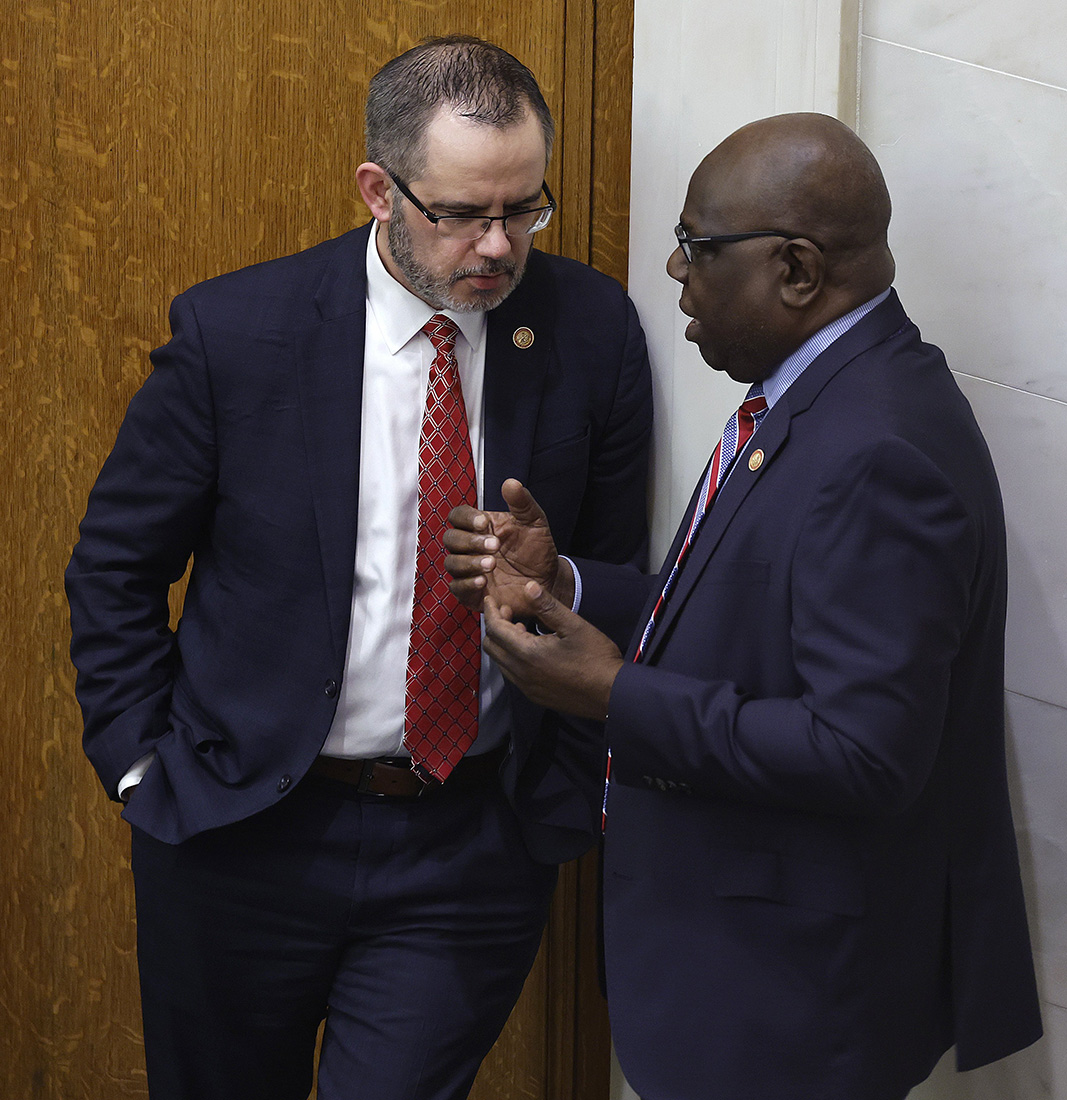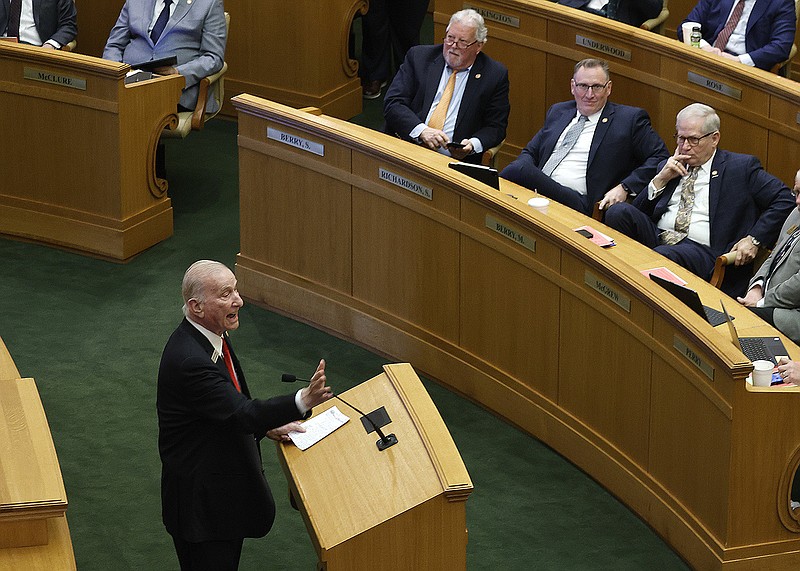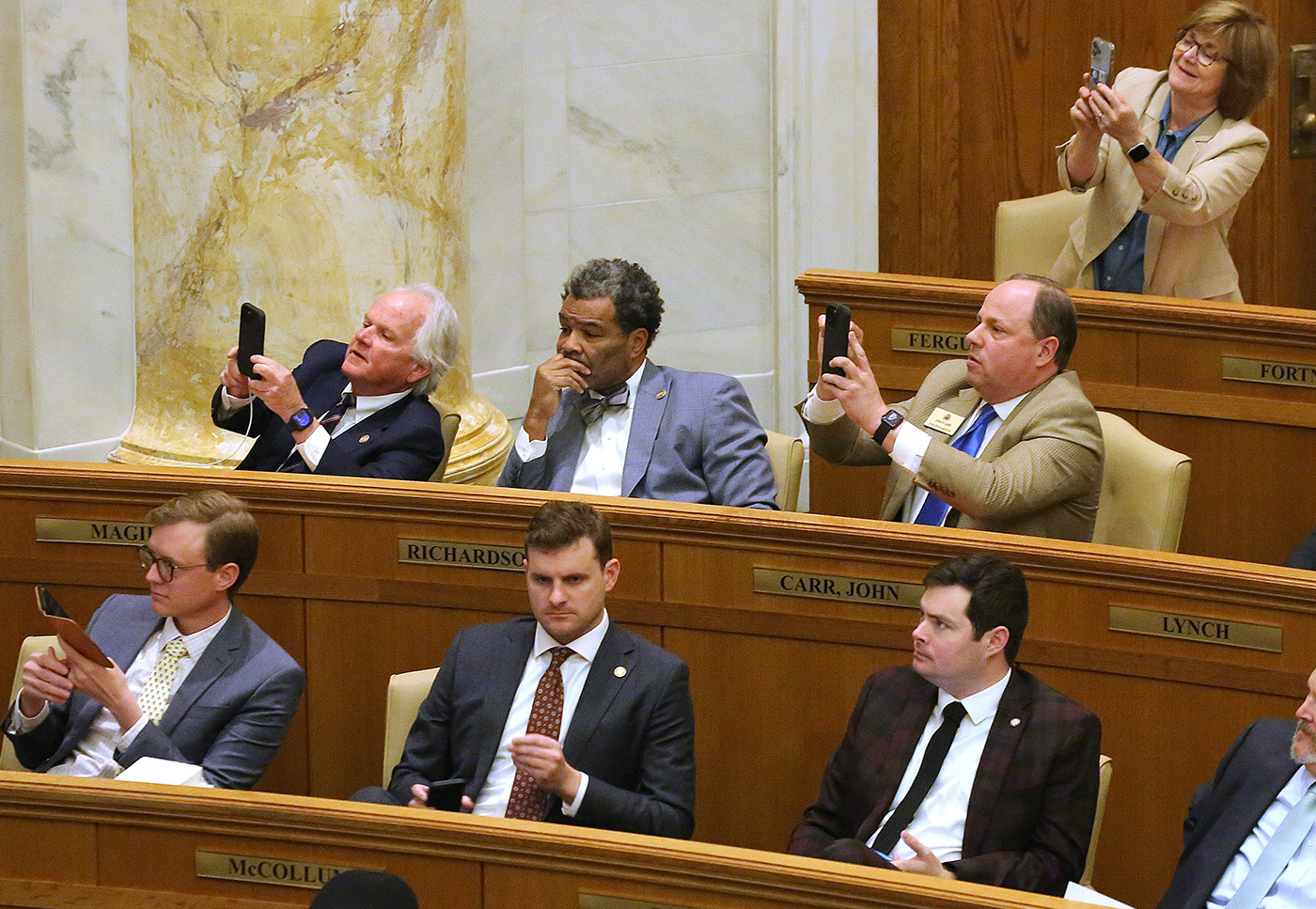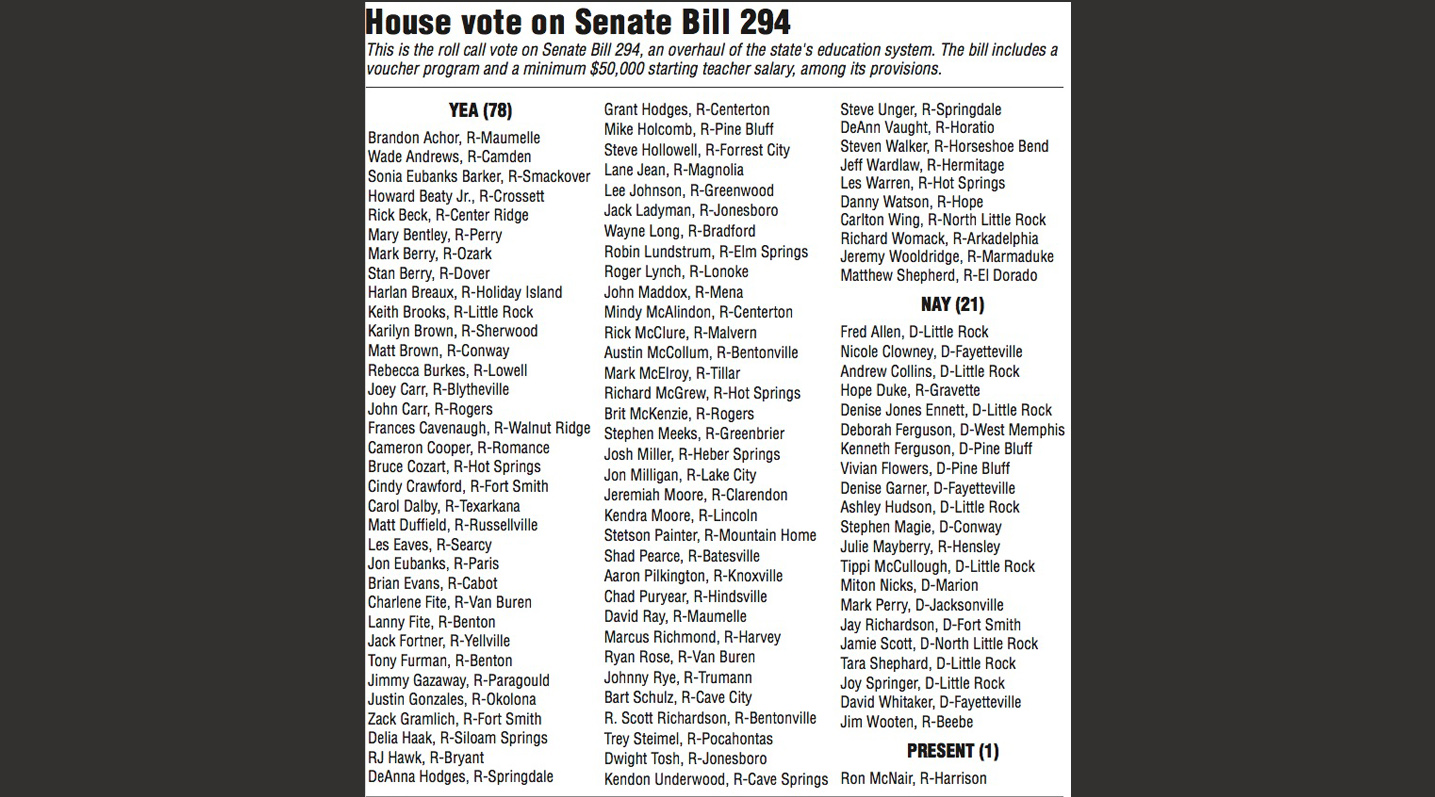Gov. Sarah Huckabee Sanders' education overhaul passed the Arkansas House of Representatives on Thursday, sending the bill to the Senate for a concurring vote.
Senate Bill 294, also known as the LEARNS Act, is the Republican governor's education reform initiative, an omnibus bill that includes state funds that students could use to attend a private or home school and a $14,000 raise in the minimum starting salary for teachers.
The bill passed the House on a 78 to 21 vote. The Senate will still need to vote to concur with the House's amendment to the bill before the bill heads to the governor for her signature.
"The Arkansas House made history today by passing my Arkansas LEARNS bill by an overwhelming majority," Sanders said in a statement. "I have my pen ready to sign the boldest, most far-reaching, most conservative education reforms in the country into law after the Senate passes this amended version early next week. These sweeping changes will address teachers' needs, defend parents' rights, and, most importantly, give our kids the quality education they deserve."
Sanders first presented details of her education proposal during a news conference in early February, announcing that her reforms would come in an all-encompassing 144-page education package that would include everything from higher starting salaries for teachers to a ban on critical race theory being taught in schools.
Thursday's vote was one of the final steps toward passage from the state Legislature, with the Senate likely approving the legislation early next week.
Sanders has received criticism for not making the bill public until Feb. 20, which kicked off a week and a half of debate among lawmakers and activists alike who said they felt the legislation was being pushed through with little input from the public.
However, the bill's sponsor, Rep. Keith Brooks, R-Little Rock, said the LEARNS Act is just the start of the process of remaking a public education system that lags behind most in the nation.
"This bill is not the end of our work, but it's the beginning of a transformation which makes a covenant with teachers, with families and, most of all, with students in our great land of opportunity," Brooks said.
The most contested part of the bill is its voucher program, known as Education Freedom Accounts. The accounts will be phased in over three years beginning in the 2023-2024 school year, with students receiving 90% of the per-student foundation funding from the previous school year, which was $7,413 for the 2022-2023 school year.
For more than 90 minutes, legislators took turns arguing for and against what they perceived was either a novel or deeply flawed approach toward improving public education in Arkansas. While Democrats have remained united against school vouchers, the bill prompted a difficult choice for some Republican lawmakers in the GOP-dominated General Assembly.
As the most prominent Republican against the bill, Rep. Jim Wooten of Beebe said he felt like he was a "voice crying from the lion's den" by taking on his own party. In a 15-minute speech, Wooten told colleagues Thursday that by voting for the bill they were "diverting money away from public education."
"Through this bill we have managed to insult, alienate, dislike, and show disdain for every single person in this state that has anything to do with public education," Wooten said.
Wooten proposed legislation to require private schools that take public funds to be barred from having selective admissions, which was voted down in committee, and said he was responding to what he thought was unfair criticism of public schools in Arkansas. He said supporters of the bill often don't understand the broken families, poverty and drug addiction which public school districts often have to cope with. Private schools, unlike public schools, screen or turn away students, he said.
"As I'm talking I want you to think about three or four things: poverty, social and societal problems we face -- drug use -- the deterioration of the family. Every single one of these are having [to] be to dealt with [by] our public schools, the ones that we have insulted and told them they're not doing the job."
A three-term representative from Beebe, Wooten was one of only three Republicans to vote against the bill. He was joined by Reps. Hope Duke of Gravette and Julie Mayberry of Hensley. Rep. Ron McNair, R-Harrison, was the lone member to vote present.
No Democrats voted in favor of the bill.
Rep. Tara Shephard, D-Little Rock, said the LEARNS Act would lead to school closures, noting that schools closed within the Little Rock School District after the state took over direct administration.
"So for those of you that's wanting to know what's possibly going to happen on the other side of this thing, I'm your example of what could happen. Schools are going to close, your communities will begin to suffer as a result of this," said Shephard, a former Little Rock School District board member.
In contrast, the bill's supporters said vouchers were an end to the status quo of education in Arkansas, which supporters say has failed countless students with many reading below grade level. Rep. David Ray, R-Maumelle, likened school vouchers to a myriad of other government programs that can be used for expenditures at private institutions, such as Pell Grants, food stamps, Medicaid or federal housing vouchers.
"What in the world is so terrible about parents getting to choose the school where their children attend and allowing the tax dollars to follow the student to that school?" Ray said. "Do we honestly think the politicians and the government are going to do a better job of allocating those resources than the parents will?"
Rep. Carlton Wing, R-North Little Rock, said the bill was a part of American tradition that emphasizes "individual liberty," empowering parents to decide what is best for their children.
"What I've heard from my constituents is we want more choices without some of the current limitations," said Rep. Rick McClure, R-Malvern. "And on that issue, they have spoken loudly, clearly and in large numbers."
Other supporters said the bill's funding for literacy coaches and tutors, and higher salaries for teachers will facilitate a long-needed fundamental change that will drastically improve education within the state.
The LEARNS Act will increase the state's minimum salary for teachers from $36,000 to $50,000 and give $2,000 raises for teachers making more than the new proposed minimum. Teachers also could receive up to $10,000 in bonuses for high test scores, or teaching in a geographical area or a subject matter in high demand.
At $50,000 a year, Arkansas would rank behind only Washington, Hawaii, New Jersey and the District of Columbia in starting teacher pay, according to the National Education Association, the largest teachers union in the country.
"This bill is a massive investment in public education, it is a massive investment in the teaching profession, but if money alone were going to solve our problems then our education problems would have been solved long ago, along with our healthcare problems, along with our crime problems, and all of the other problems that ail society," Ray said.
According to an estimate from the state Department of Education, the LEARNS Act will cost $297 million in the first year, with $150 million being new spending. The Educational Freedom Accounts will cost $46.7 million in the first year and $97.5 million in the second year, according to the estimate.
The voucher program will be phased in over three years, beginning with the 2023-2024 school year with students enrolled at F-rated schools; enrolled in kindergarten; who were or are in a foster care program; who have a disability; or who have an active-duty military parent receiving first priority.
In the following school year, the program will extend to students enrolled in a D-rated school; who have a parent who is a military veteran; or who are children of first responders.
By the 2025-2026 school year, every student who is eligible to enroll in a public school will be eligible for a voucher to attend a private or home school.
PROCESS
The Senate Education Committee is scheduled to take up the bill at its meeting Monday, where it is expected to approve the bill before the Senate takes up the bill for a concurring vote on the amendment.
Brooks filed a six-page amendment to the bill last week that includes more privacy protections for school safety plans that lawmakers want to be confidential and technical corrections. While the bill would repeal the Fair Teacher Dismissal Act, a law that requires school districts to notify teachers of changes in their employment status before May 1 each year, Brooks' amendment includes language to give teachers "an opportunity for a hearing" before the school board before they can be fired.
The Senate passed the LEARNS Act a week ago, with some pushback from Democrats and some Republicans arguing the process was rushed following a vote on the Senate floor just three days after it was introduced.
House Minority Leader Tippi McCullough, D-Little Rock, a former English teacher, also criticized the bill for being drafted behind closed doors and without the input of many teachers and administrators.
"I care more about helping teachers and students than I do about political affiliation, and many of you knew that when this bill was getting drafted," McCullough said. "But no one chose to reach out or work with me or anyone in our caucus."
House Speaker Matthew Shepherd, R-El Dorado, said he did not feel like the process was rushed, citing the seven hours of testimony the House Education Committee heard on the bill Tuesday.
"I don't know if the process is ever going to be something that everybody likes, but the fact is legislation in the Arkansas Legislature, due to time constraints and other things, it moves through pretty quickly," Shepherd said.
OTHER COMMENTS
Heritage Action for America, a policy group affiliated with the Washington D.C.-based think tank Heritage Foundation, praised Sanders' education bill.
"For too long, American children have been forced into a one-size-fits-all education system," Janae Stracke, vice president of field operation for Heritage Action, said in a news release. "Now, Arkansas can return power to parents to make the educational choices they know are right for their kids."
In contrast, Carol Fleming, president of the Arkansas Education Association, called for lawmakers to pause to take more input before passing the bill.
"The voices of hundreds of educators, parents, disability advocates and others have been ignored by those who represent us," Fleming said in a news release Thursday. "Despite pleas to our legislators to slow down and answer questions about the negative impact this bill could have on our children, it continues its sprint through the [Capitol]."
 Rep. Keith Brooks (left), House sponsor of the education bill, speaks with Rep. Fred Allen, D-Little Rock, during debate over the measure Thursday in the House. Before the vote, Brooks called the bill “the beginning of a transformation which makes a covenant with teachers, with families and most of all, with students in our great land of opportunity.” More photos at arkansasonline.com/33learns/. (Arkansas Democrat-Gazette/Thomas Metthe)
Rep. Keith Brooks (left), House sponsor of the education bill, speaks with Rep. Fred Allen, D-Little Rock, during debate over the measure Thursday in the House. Before the vote, Brooks called the bill “the beginning of a transformation which makes a covenant with teachers, with families and most of all, with students in our great land of opportunity.” More photos at arkansasonline.com/33learns/. (Arkansas Democrat-Gazette/Thomas Metthe)


